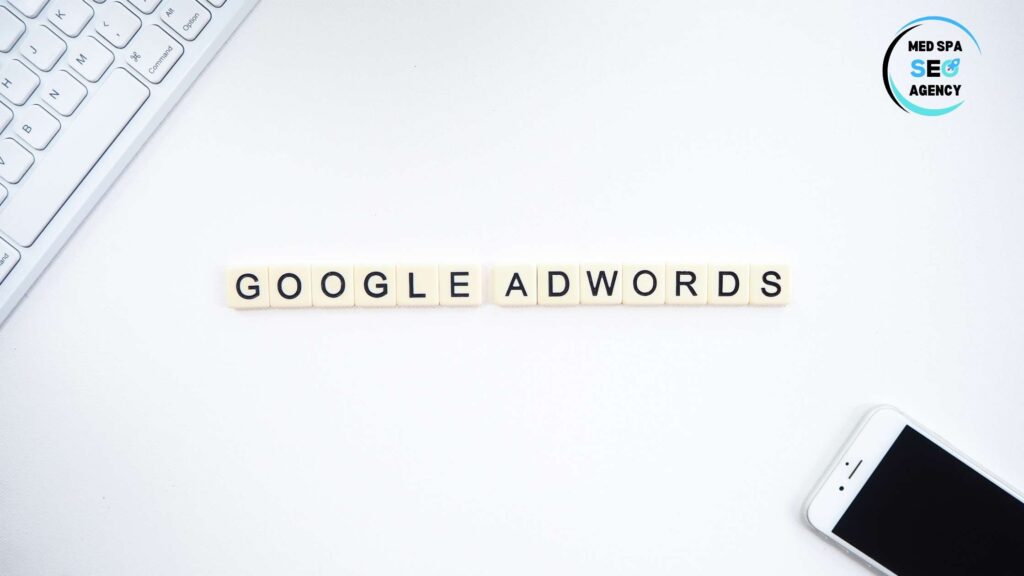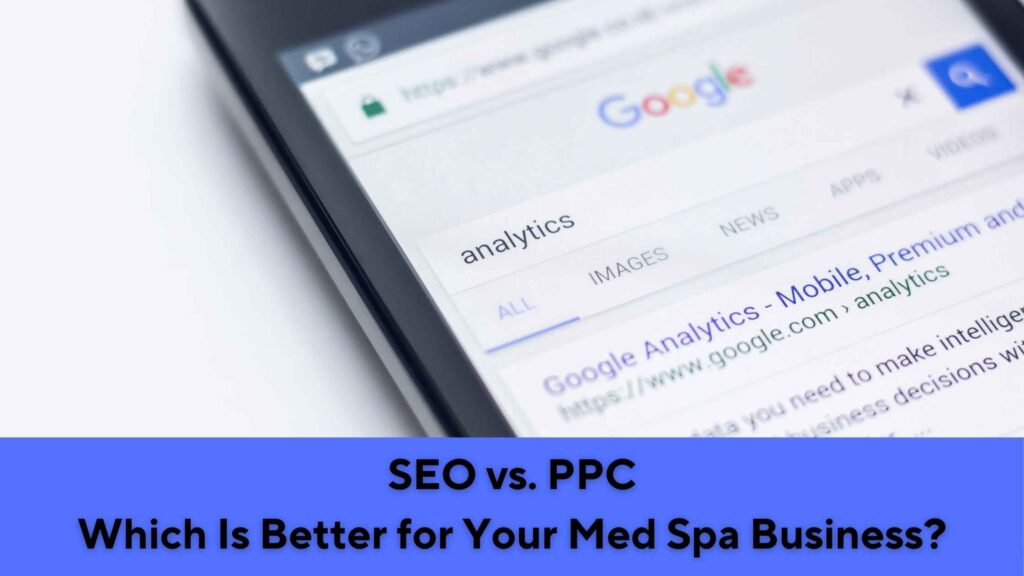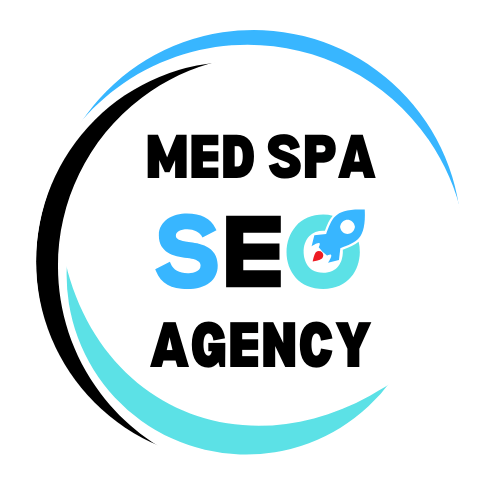If you own a med spa business, you’re likely looking for the best way to attract new clients online. But should you focus on SEO or PPC? Both strategies can boost your visibility on search engines, but they work in different ways. In fact, many successful med spas use SEO and PPC together to maximize their reach and drive consistent traffic. This article will explain the difference between SEO and PPC, their pros and cons, and help you decide which one is better for your med spa business.
The Search Landscape
When people search for med spa services, they turn to search engines like Google. The search engine results pages (SERPs) show two types of results: organic search results and paid search ads.
Organic search results are achieved through search engine optimization (SEO). These results appear naturally when your website is relevant and well-optimized for specific keywords.
Paid search ads are displayed at the top of the page or at the bottom, labeled as “Ad.” These ads are powered by pay-per-click (PPC) marketing, where you pay each time someone clicks on your ad.
Understanding how these results work is essential for choosing the right search marketing strategy for your med spa.
Definition of SEO
SEO (Search Engine Optimization) is the process of improving your website’s visibility in organic search results. It helps you attract free, high-quality organic traffic by optimizing your website for relevant keywords. Here are the main components of SEO:

1. Keyword Research
Keyword research is the foundation of SEO. It involves finding relevant words and phrases that potential clients use when searching for med spa services. By understanding what your audience is searching for, you can create targeted content that ranks high on search engine results pages.
2. On-page Optimization
On-page SEO focuses on optimizing individual web pages to improve organic visibility. This includes:
Using keywords in meta titles, descriptions, headers, and throughout the content.
Ensuring high-quality, informative content that answers user queries.
Optimizing images with alt tags for better visibility.
3. Off-page Optimization
Off-page SEO involves activities outside your website that impact your organic search results. This includes building high-quality backlinks from other reputable sites, engaging on social media, and managing online reviews. Off-page SEO builds authority and credibility, which can improve your ranking on search engines.
4. Technical SEO
Technical SEO focuses on the backend structure of your website, ensuring that it is fast, secure, and easy to navigate. This includes:
Enhancing website speed for a better user experience.
Making your website mobile-friendly to reach more users.
Implementing secure HTTPS connections for data protection.
Creating an XML sitemap to help search engines index your pages more effectively.
Pros of Using SEO
1. SEO Is Sustainable
SEO delivers long-term benefits. Once your website achieves a good ranking on search engine results pages, you’ll continue to receive traffic without ongoing costs.
2. SEO Is Cheaper In The Long Term
While SEO requires an initial investment in content creation and optimization, it’s more cost-effective than PPC in the long run because you don’t pay per click.
3. SEO Builds Awareness
Appearing in organic results enhances brand awareness and positions your med spa as an industry leader.
4. SEO Increases Credibility and Trust
Users trust organic search results more than ads, boosting your credibility and authority.
5. No Cost Per Click
With SEO, you don’t have to pay each time someone visits your site, unlike PPC ads. This makes SEO a budget-friendly option for sustained growth.
Cons of SEO
1. SEO Is Highly Competitive
Ranking high on search engines is competitive, especially in the med spa industry. It requires consistent effort and high-quality content creation.
2. SEO Takes Time
Unlike PPC, SEO campaign takes time to deliver results. It may take months to see significant traffic and conversions.
3. SEO Requires Authoritative Content
To rank higher, SEO requires producing high-quality, authoritative content that provides real value to users.
Definition of PPC
PPC (Pay-Per-Click) marketing is a paid advertising strategy that drives instant traffic to your website. When you run a PPC campaign, your ad appears at the top of the page in the search engine results pages, and you pay each time someone clicks on it. Here’s how PPC marketing works:

1. Keyword Research
Just like SEO, PPC starts with keyword research to identify high-converting keywords for your med spa services.
2. Bid Setting
In PPC marketing, you set a bid for each keyword. Higher bids increase your chances of appearing at the top of the page.
3. Creation of Ad
Crafting persuasive ad copy is crucial for attracting clicks. Your ad should be relevant, informative, and include a strong call-to-action.
4. Audience Targeting and Retargeting
PPC platforms like Google Ads allow you to target specific audiences by location, demographics, and interests. Retargeting lets you re-engage users who previously visited your site.
Pros of Using PPC
1. Instant Visibility
PPC ads provide immediate visibility on search engines, driving instant traffic to your med spa website. Unlike organic search, where it takes time to rank, PPC puts your ad at the top of the page of search results. This makes it an effective digital marketing strategy for generating quick leads and appointments.
2. PPC Allows For Precise Targeting
With PPC marketing, you can precisely target your audience based on location, age, interests, and more. This ensures that your ads reach the right people who are actively searching for med spa services. By leveraging advanced targeting options, you can improve the conversion rate of your campaigns.
3. Quick Experimentation
PPC allows for rapid testing of different ad copy, keywords, and landing pages. You can easily experiment with different approaches to see which performs best. By analyzing the data, you can make quick adjustments to optimize your campaigns for the best results.
4. Measurable Results
One of the biggest advantages of PPC is the ability to track and measure your campaigns in real time. PPC platforms provide detailed analytics, including clicks, impressions, and conversion rates. Additionally, Google Ads uses a quality score to determine the relevance and effectiveness of your ads, influencing your bid and ad placement. This data allows you to calculate the ROI of your ad spend accurately.
5. More Budget Control
With PPC, you have full control over your budget. You can set daily spending limits, adjust bids for specific keywords, and pause campaigns anytime. This flexibility helps you manage your advertising costs efficiently, ensuring that you never overspend. By monitoring quality scores and optimizing your ads, you can maintain a high conversion rate while staying within budget.
PPC is a powerful tool in digital marketing that provides instant visibility, precise targeting, and measurable results. By effectively managing quality scores and focusing on conversion rate optimization, your med spa can see immediate growth and increased bookings.
Cons of PPC
1. PPC Is Expensive
PPC campaigns can be costly, especially for competitive keywords in the med spa industry.
2. Click Fraud
Click fraud occurs when competitors or bots click on your ads, wasting your budget.
3. PPC Requires Constant Investment
When you stop paying, your ads disappear, which means PPC requires ongoing investment to maintain visibility.
SEO vs. PPC: Which Is Better for Your Med Spa Business?
The choice between SEO and PPC depends on your goals and budget. If you want long-term growth and trust, use SEO. If you need quick visibility and immediate leads, use PPC. Many businesses find success by combining both strategies to maximize organic visibility and paid search traffic.

Med Spa SEO Agency provides professional SEO consultations specifically for med spa businesses in the United States. You can also have a one-on-one call with us, where we’ll discuss everything you need to grow your business.
Final Thoughts
Both SEO and PPC are powerful tools for growing your med spa business. By understanding their pros and cons, you can make an informed decision that aligns with your goals. For the best results, consider using a mix of both strategies.
Need help with your SEO or PPC campaigns? Contact us today and let’s grow your med spa business together!
Frequently Asked Questions (FAQs)
1. Is SEO or PPC Better for My Med Spa Business?
The choice between SEO or PPC depends on your goals. SEO stands for search engine optimization and helps improve your website’s visibility in organic search results, leading to long-term growth. Whereas PPC (pay-per-click) advertising gives you instant visibility by placing your ads right at the top of search engine results, but you pay a fee each time someone clicks. If you need quick leads, PPC may be a better option. If you want sustainable traffic from organic search, SEO is the way to go.
2. What are The Pros and Cons of SEO?
SEO refers to optimizing your website to improve its visibility in organic search engine results. Some of the key pros include:
✅ Sustainable traffic without ongoing ad costs
✅ Builds credibility and trust with users
✅ Helps your business rank on the first page of search engine results
However, SEO efforts take time and require continuous optimization. A key challenge is that search engine algorithms change frequently, meaning you must adapt your strategy.
3. How Does PPC Advertising Work?
PPC focuses on paid search ads that appear right at the top of search engine results. You’re willing to pay for each click, allowing you to get immediate traffic to your site. PPC offers flexibility in terms of budget control and audience targeting, making it an effective marketing tactic.
4. What Is Local SEO, and How Can It Help My Med Spa?
Local SEO is a smart SEO strategy that helps businesses improve their visibility in organic search results for location-based searches. By optimizing for target keywords related to your area and ensuring your business is listed on platforms like Google My Business, you can attract more local clients.
5. What SEO Tasks Should I Focus On?
Creating SEO-friendly content and optimizing for search engines that your site relies on is crucial. Some essential SEO tasks include:
Keyword research to find the right target keywords
Optimizing website content, meta titles, and descriptions
Building high-quality backlinks to boost authority
Ensuring fast loading speed and mobile-friendly design
6. Should I Spend on PPC or Invest in SEO?
If you have a limited marketing budget, you may want to use SEO for long-term growth, as it generates organic search engine traffic without requiring continuous ad spend. However, if you need quick results, PPC or SEO combined can work well together to balance immediate traffic with long-term ranking improvements.
7. What’s The Difference Between PPC and SEO Marketing Campaigns?
SEO efforts focus on ranking your website higher in organic search results without direct costs per click. PPC, on the other hand, allows you to pay a fee each time someone clicks on your ad, giving you immediate exposure. If your goal is to appear at the top of search engine results quickly, PPC is ideal. If you want sustainable growth, SEO is a better long-term strategy.
8. Can I Use Both SEO and PPC for My Med Spa?
Yes! Many businesses fall into this category of using both marketing tactics. PPC offers instant visibility, whereas SEO may take longer but builds lasting credibility. A combined approach can help you dominate the first page of search engine results while ensuring steady traffic from organic search.
9. How Can I Learn More About SEO and PPC for My Med Spa?
If you want to improve your online presence, you can start by researching search engine algorithms, creating SEO-friendly content, and experimenting with PPC advertising. Need expert help? Contact us today to optimize your marketing campaigns and grow your med spa business.
